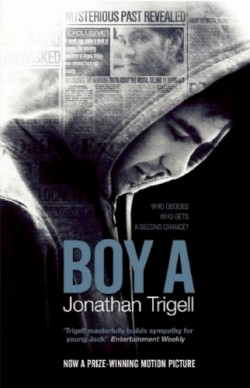Boy A
For some men, the path from boyhood to adulthood is only as difficult as learning how to shave. For the protagonist of Jonathan Trigell’s novel, Boy A, winner of the John Llewellyn Rhys Prize and the Waverton Award, the journey is more complicated. Boy A’s fatal mistake as a child has repercussions far into his future, and no matter how much he grows into a contributing member of society, his past will always be an inescapable part of himself.
After allegedly helping a friend murder a classmate, Boy A is found guilty and imprisoned for a dozen years, half his life. When he is finally released at age twenty-four, sparking public outrage, a new kind of trial begins as he tries to find his place in the free world. Armed with a new name, a new history, a job, a flat, and even friends, he tries to start over with the help of Terry, his advocate and the only person who knows his real past and still is willing to help.
His new life is far from easy. Ever aware that freedom could be revoked for any misstep, he is extremely anxious about behaving well and blending in. Even a heroic act brings more fear of exposure than feelings of pride.
The structure of Boy A makes this novel welcoming and accessible despite its dark, shadowy subject. Each short chapter is headed by a subsequent letter from the alphabet, accompanied by a sing-song chant such as a child might hum to himself. Chapters alternate between present and past, and tangential characters, such as Boy A’s parents and therapists, take turns at telling their stories and opinions from their own point of view.
In spite of knowing his crime, readers will want to like this young man, and would likely welcome him home for a meal. This turn of compassion for a character who committed a heinous crime is the heart of the novel and a lesson on human behavior that the reader will likely mull over long after the cover has closed. Trigell has produced a work of fiction that resonates beyond the page and offers readers a chance to witness how perpetrators can become victims, how evil and good are not clear opposites, but might grow out of one another in a regretful mutation.
Reviewed by
Andi Diehn
Disclosure: This article is not an endorsement, but a review. The publisher of this book provided free copies of the book to have their book reviewed by a professional reviewer. No fee was paid by the publisher for this review. Foreword Reviews only recommends books that we love. Foreword Magazine, Inc. is disclosing this in accordance with the Federal Trade Commission’s 16 CFR, Part 255.

